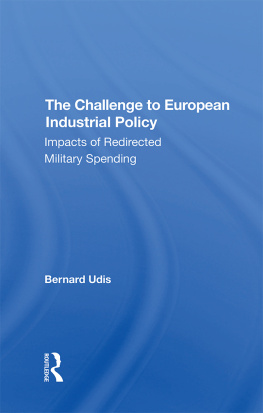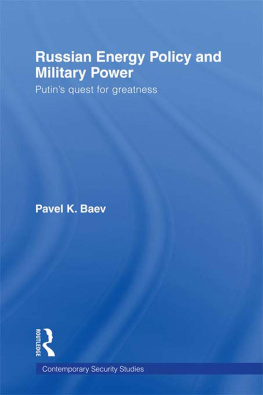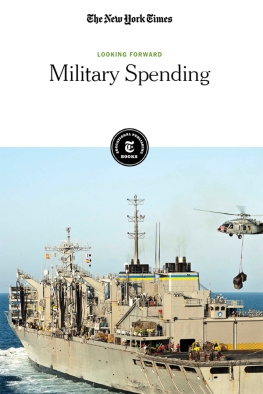The Challenge to European Industrial Policy
About the Book and Author
Examining recent European experience with industrial policy, Dr. Udis explores ways to ease the transition to reduced or redirected levels of military spending. He surveys government policies in Great Britain, France, West Germany, Sweden, Belgium, the Netherlands, and Italy, identifying strategies for individuals, firms, and regions as they adjust to shifts in the economy. Regional development, science and technology, and labor market policies are analyzed in conjunction with public procurement strategies and government aid for exports and international ventures. The book includes material drawn from the author's interviews with government officials and industry leaders, illustrating practitioners' perspectives on these measures and on the nature of diversification and conversion. Their views and experience, the author argues, will be valuable tools for policymakers weighing the costs and benefits of implementing industrial policies in the United States.
Bernard Udis is professor of economics, University of Colorado. He has published numerous journal articles and is the author of From Guns to Butter: Technology Organizations and Reduced Military Spending in Western Europe (1978).
The Challenge to European Industrial Policy
Impacts of Redirected Military Spending
Bernard Udis
First published 1987 by Westview Press, Inc.
Published 2019 by Routledge
52 Vanderbilt Avenue, New York, NY 10017
2 Park Square, Milton Park, Abingdon, Oxon OX14 4RN
Routledge is an imprint of the Taylor & Francis Group, an informa business
Copyright 1987 Taylor & Francis
All rights reserved. No part of this book may be reprinted or reproduced or utilised in any form or by any electronic, mechanical, or other means, now known or hereafter invented, including photocopying and recording, or in any information storage or retrieval system, without permission in writing from the publishers.
Notice:
Product or corporate names may be trademarks or registered trademarks, and are used only for identification and explanation without intent to infringe.
Library of Congress Cataloging-in-Publication Data
Udis, Bernard.
The challenge to European industrial policy.
(Westview special studies in international economics)
Includes index.
1. Industry and stateEurope. I. Title.
II. Series.
HD3616.E8U35 1987 338.94 86-19110
ISBN 0-8133-7234-8
ISBN 13: 978-0-367-29065-8 (hbk)
This study would not have been possible without the cooperation of many individuals both here and abroad, and I am deeply indebted to them. Unfortunately, the requirement of confidentiality forbids my naming them individually. However, I wish to express my profound appreciation to all those European executives, government officials, and scholars who gave so generously of their time to openly discuss sensitive matters. Their cooperation was critical to the success of this venture. In addition, I wish to thank the foreign service officers and other staff members of American embassies in the countries studied for their unfailing generosity and assistance.
There are several individuals whom I feel free to name and am obliged to thank for their help and personal involvement. John Lynch of the Office of Economic Adjustment of the U.S. Department of Defense provided me the opportunity to conduct the study out of which this book grew, Mrs. Sally Hofmockel prepared the seemingly endless versions of the manuscript with good humor and a high level of competence. Her new daughter, Amy E. Hofmockel, also displayed thoughtful consideration by delaying her arrival until her mother had completed the final manuscript. Susan McEachern of Westview Press cheerfully guided author and manuscript safely through the shoals of the publication process. Finally, I wish to express my deep gratitude to Margaret Grace Williams, who was, in a unique way, present at the creation of this work and supported it through every stage of its development.
Bernard Udis
1
Introduction
The goal of this effort is to extend an earlier study of European policy instruments available to ease the adjustment to reduced levels of military spending. That study found few relevant European examples of mechanisms to aid effectively the transition of military productive capacity to civilian output. The updating effort was conducted during January 1985 in France, the Federal Republic of Germany, Sweden and the United Kingdom, supplemented by mail and telephone communications with sources in Belgium, Holland, and Italy.
All countries studied have an array of existing policies which might be helpful in easing a transition to lower levels of military spending, which collectively might be described as industrial policies.) appears at the end of this section tracing their evolution from the pre-1974 period through the reactions to the first series of oil price shocks of 1973-1974 and most recently through the changes of 1979-1980. Despite their diversity, they are linked by the fact that they were not designed specifically to aid a military to civil transfer of resources. Their origins are, of course, less important than their possible effectiveness in easing the strain of economic conversion. For this reason, the question of their potential relevance and usefulness in dealing with the economic conversion issue was repeatedly asked of government officials, industrialists, and other informed persons. Their responses appear throughout this volume.
Widespread concern over the economic and social strains which might result from a substantial reduction in the level of military expenditures was not encountered in any of the countries studied. The principal reason for this relative complacency is that military expenditures are seen as being a normal part of the government budget and likely to remain that way. While military expenditures represent a relatively small share of the gross national product, they do show some cycling over time, reflecting changes in geo-political conditions and the more prosaic completion of large procurement projects with gradually lengthening periods of slack in between.
The typical government position is that cycles in military markets are sufficiently familiar to permit most firms to plan in advance for adjustment and the development of alternative products and markets. In other words, preparation for and adjustment to variations in military procurement is viewed as a normal managerial responsibility in a dynamic economy. This pattern is probably made more explicit in the Federal Republic of Germany than in most other countries, but the position is not unique. The Swedish government has demonstrated more interest in the general issue of economic conversion, as evidenced by several government studies and reports, but even there, few explicit policy actions can be identified.
A distinction must be made between government positions and the concerns of minority political parties and private groups. There is no shortage of concerns about easing the adjustment process among certain trade union groups, "peace" groups, and out-of-power political groups. It should be noted however, that while questions in the West German Parliament concerning the utilization of defense industry production capacity in the event of disarmament agreements often are raised by individual Social Democratic legislators, the official position of the current Christian Democratic government is almost indistinguishable from that of the predecessor Social Democratic administration; namely, that the responsibility of planning to meet such transitions is principally that of industry.












